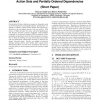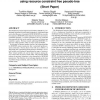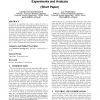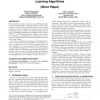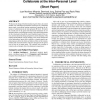ATAL
2008
Springer
15 years 3 months ago
2008
Springer
We study the concept of bribery in the situation where voters are willing to change their votes as we ask them, but where their prices depend on the nature of the change we reques...
127
click to vote
ATAL
2008
Springer
15 years 3 months ago
2008
Springer
Decentralized Markov decision processes are frequently used to model cooperative multi-agent systems. In this paper, we identify a subclass of general DEC-MDPs that features regul...
123
click to vote
ATAL
2008
Springer
15 years 3 months ago
2008
Springer
The Distributed Constraint Optimization Problem (DCOP) is a fundamental formalism for multi-agent cooperation. A dedicated framework called Resource Constrained DCOP (RCDCOP) has ...
106
click to vote
ATAL
2008
Springer
15 years 3 months ago
2008
Springer
This paper addresses the problem of plan recognition for multiagent teams. Complex multi-agent tasks typically require dynamic teams where the team membership changes over time. T...
ATAL
2008
Springer
15 years 3 months ago
2008
Springer
We present an algorithm that allows swarms of robots to navigate in environments containing unknown obstacles, moving towards and spreading along 2D shapes given by implicit funct...
ATAL
2008
Springer
15 years 3 months ago
2008
Springer
In this article, we propose an approach of nonverbal interaction with virtual agents to control agents' behavioral expressivity by extracting and combining acoustic and gestu...
106
click to vote
ATAL
2008
Springer
15 years 3 months ago
2008
Springer
The application of reinforcement learning algorithms to Partially Observable Stochastic Games (POSG) is challenging since each agent does not have access to the whole state inform...
107
click to vote
ATAL
2008
Springer
15 years 3 months ago
2008
Springer
Keepaway is a sub-problem of RoboCup Soccer Simulator in which 'the keepers' try to maintain the possession of the ball, while 'the takers' try to steal the ba...
ATAL
2008
Springer
15 years 3 months ago
2008
Springer
Several multiagent reinforcement learning (MARL) algorithms have been proposed to optimize agents' decisions. Only a subset of these MARL algorithms both do not require agent...
113
click to vote
ATAL
2008
Springer
15 years 3 months ago
2008
Springer
We discuss the design of the Intermediary Agent's brain, the control module of an embodied conversational virtual peer in a simulation game aimed at providing learning experi...

